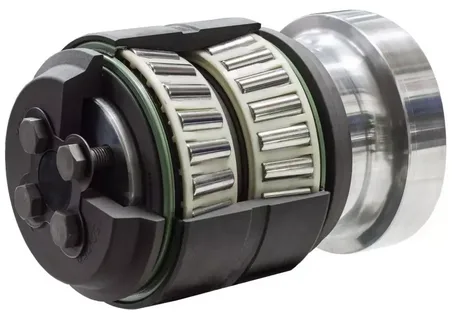
The railway bearing market is poised for substantial growth, with projections suggesting it will reach USD 3.12 billion by 2033, driven by a robust CAGR of 9.00%. Railway bearings are essential for ensuring smooth operations and safety within the rail sector by reducing friction between moving parts, allowing for efficient train movement.
Rising global investments in railway infrastructure, coupled with an increased focus on efficiency and reliability, are expected to drive demand for high-quality railway bearings in the coming years. This positive outlook highlights the critical role railway bearings play in supporting the continued momentum of the global rail industry.
Government Investments in Railway Infrastructure:
Governments in both developed and developing nations are making significant investments in railway infrastructure, boosting the need for components used in both freight and passenger trains. As railway systems expand, the demand for bearings in rail applications is expected to grow accordingly.
For instance, in March 2020, the United States allocated USD 248.5 million in grants through the CRISI Program to support various state and municipal railroad infrastructure projects. These grants aim to enhance railway network safety, and since roller bearings play an indirect role in ensuring the safety of these systems, this funding is anticipated to contribute to the growth of the railway bearing market.
Get a Comprehensive Railway Bearing Industry Overview – Request Your Sample Report and Drive Business Success!
Industry Participants are Concentrating on Developing Bearings To Capitalise on Demand:
As railway carriers are continuously in motion and frequently exposed to harsh physical conditions such as rain, freezing temperatures, and extreme heat, mechanical components utilized in them must be resistant to such extreme physical conditions. As a result, long-lasting roller bearings are in high demand.
To capitalize on the increased rail bearing demand, market participants are focused on producing bearings that can resist such harsh climatic conditions. Bearings are coated with ceramics or polymers to improve insulation and safety.
The availability of a diversified range of roller bearing and ball bearings, including cylindrical, tapered, angular contact, four-point contact, electrically insulated, deep groove, and so on, makes them suitable for use in a wide range of sites and applications, hence boosting market revenue.
Opportunities for Growth:
The demand for plain bearings in energy-efficient cars increased usage of high-capacity bearings in wind turbines, and rail bearing demand in the railway and other industries are some of the key factors driving the railway bearing market. The market may see new growth potential as electro-mechanical features are incorporated into ball bearings for medical purposes.
Competitive Landscape:
Market competitors are concentrating on creating products with novel features including improved durability, greater lightness, minimal maintenance requirements, and cost-effectiveness.
Several of the top contributors, including NSK Ltd., The Timken Company, JTEKT Corporation, National Engineering Industries Limited, Amsted Rail Company, NTN Corporation, Schaeffler Group, and SKF AB among others, control the railway sliding bearing market, which is very concentrated. Among these, SKF, Schaeffler, and NTN hold a sizeable market share of the railway bearing market.
To stay ahead of their competitors, businesses are forming new strategic alliances, making significant investments in research and development projects, and introducing new products to the market.
Product Advancements Pivotal for Railway Bearings Manufacturers:
- NSK Ltd. created high-reliability, low-maintenance gearbox bearings in March 2020 that can be applied to both large and small gears. Similarly, NSK Ltd. declared in September 2020 that Japan’s Shinkansen fast train was using its bearings.
- Players in the market are collaborating with one another to raise their profiles and strengthen their distribution capabilities.
- Important advancements in this theory include AB SKF’s relationship with Siemens to distribute its wireless bearing products in 2018.
Regional Evaluation:
Throughout the projected period, the Asia-Pacific region is anticipated to be a strong and swift railway bearing market. The presence of large-to-small-scale railway operators, builders, and suppliers has made China and Japan the top two marketplaces in the area.
India is to experience significant growth during the projected period, largely as a result of the nation’s expanding transportation infrastructure, quick urbanization, and massive population expansion.
Railway Bearing Market Segmentation:
By Product Type:
- Roller Bearing
- Ball Bearing
- Plain Bearing
By Train Type:
- Very High-Speed Train
- Mainline Train
- Metro Train
- Freight Train
- Special Train
By Application:
- Engine
- Wheel
- Interior
- Exterior
By Sales Channel:
- OEM
- Aftermarket
By Region:
- North America
- Latin America
- Europe
- South Asia & Pacific
- East Asia
- Middle East and Africa
About Future Market Insights (FMI)
Future Market Insights, Inc. (ESOMAR certified, recipient of the Stevie Award, and a member of the Greater New York Chamber of Commerce) offers profound insights into the driving factors that are boosting demand in the market. FMI stands as the leading global provider of market intelligence, advisory services, consulting, and events for the Packaging, Food and Beverage, Consumer Technology, Healthcare, Industrial, and Chemicals markets. With a vast team of over 400 analysts worldwide, FMI provides global, regional, and local expertise on diverse domains and industry trends across more than 110 countries.
Contact Us:
Future Market Insights Inc.
Christiana Corporate, 200 Continental Drive,
Suite 401, Newark, Delaware – 19713, USA
T: +1-347-918-3531
For Sales Enquiries: sales@futuremarketinsights.com
Website: https://www.futuremarketinsights.com
LinkedIn| Twitter| Blogs | YouTube
